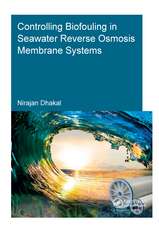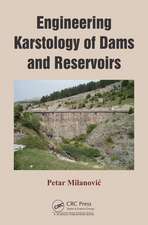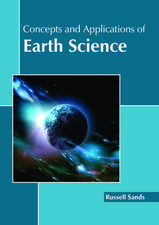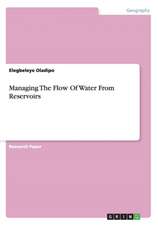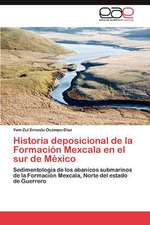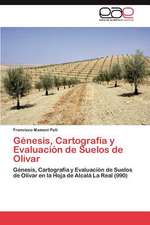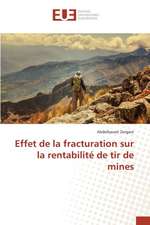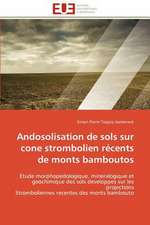Adaptation to Climate Change through Water Resources Management: Capacity, Equity and Sustainability: Earthscan Studies in Water Resource Management
Editat de Dominic Stucker, Elena Lopez-Gunnen Limba Engleză Hardback – 21 aug 2014
Taking a systems approach, this book analyzes evidence from 26 countries and identifies common barriers and bridges for local adaptation to climate change through water resources management. It includes a global set of case studies from places experiencing increased environmental and social pressure due to population growth, development and migration, including in Africa, Asia, Australia, Europe, North and South America.
All chapters consider the crosscutting themes of adaptive capacity, equity, and sustainability. These point to resilient water allocation policies and practices that are capable of protecting social and environmental interests, whilst ensuring the efficient use of an often-scarce resource.
| Toate formatele și edițiile | Preț | Express |
|---|---|---|
| Paperback (1) | 378.66 lei 3-5 săpt. | +20.59 lei 7-13 zile |
| Taylor & Francis – 8 dec 2017 | 378.66 lei 3-5 săpt. | +20.59 lei 7-13 zile |
| Hardback (1) | 1068.91 lei 6-8 săpt. | |
| Taylor & Francis – 21 aug 2014 | 1068.91 lei 6-8 săpt. |
Din seria Earthscan Studies in Water Resource Management
-
 Preț: 378.66 lei
Preț: 378.66 lei -
 Preț: 326.49 lei
Preț: 326.49 lei -
 Preț: 311.39 lei
Preț: 311.39 lei -
 Preț: 155.43 lei
Preț: 155.43 lei - 8%
 Preț: 389.09 lei
Preț: 389.09 lei -
 Preț: 310.12 lei
Preț: 310.12 lei -
 Preț: 256.02 lei
Preț: 256.02 lei -
 Preț: 312.20 lei
Preț: 312.20 lei -
 Preț: 279.32 lei
Preț: 279.32 lei -
 Preț: 326.26 lei
Preț: 326.26 lei -
 Preț: 470.90 lei
Preț: 470.90 lei - 18%
 Preț: 1060.25 lei
Preț: 1060.25 lei -
 Preț: 491.82 lei
Preț: 491.82 lei - 10%
 Preț: 311.38 lei
Preț: 311.38 lei - 18%
 Preț: 1000.27 lei
Preț: 1000.27 lei -
 Preț: 479.19 lei
Preț: 479.19 lei -
 Preț: 442.68 lei
Preț: 442.68 lei - 18%
 Preț: 1000.27 lei
Preț: 1000.27 lei - 18%
 Preț: 1056.32 lei
Preț: 1056.32 lei - 18%
 Preț: 1054.71 lei
Preț: 1054.71 lei - 18%
 Preț: 1064.70 lei
Preț: 1064.70 lei - 18%
 Preț: 1001.84 lei
Preț: 1001.84 lei - 18%
 Preț: 1051.55 lei
Preț: 1051.55 lei - 25%
 Preț: 767.07 lei
Preț: 767.07 lei - 18%
 Preț: 1002.80 lei
Preț: 1002.80 lei - 18%
 Preț: 1056.00 lei
Preț: 1056.00 lei -
 Preț: 469.34 lei
Preț: 469.34 lei - 18%
 Preț: 1173.90 lei
Preț: 1173.90 lei -
 Preț: 485.46 lei
Preț: 485.46 lei - 18%
 Preț: 1009.74 lei
Preț: 1009.74 lei - 26%
 Preț: 762.57 lei
Preț: 762.57 lei - 26%
 Preț: 764.20 lei
Preț: 764.20 lei - 12%
 Preț: 312.43 lei
Preț: 312.43 lei - 18%
 Preț: 730.71 lei
Preț: 730.71 lei - 12%
 Preț: 325.34 lei
Preț: 325.34 lei - 31%
 Preț: 765.36 lei
Preț: 765.36 lei -
 Preț: 409.31 lei
Preț: 409.31 lei -
 Preț: 416.22 lei
Preț: 416.22 lei -
 Preț: 483.49 lei
Preț: 483.49 lei - 18%
 Preț: 1001.84 lei
Preț: 1001.84 lei
Preț: 1068.91 lei
Preț vechi: 1303.55 lei
-18% Nou
Puncte Express: 1603
Preț estimativ în valută:
204.53€ • 213.55$ • 169.28£
204.53€ • 213.55$ • 169.28£
Carte tipărită la comandă
Livrare economică 05-19 aprilie
Preluare comenzi: 021 569.72.76
Specificații
ISBN-13: 9780415635936
ISBN-10: 0415635934
Pagini: 482
Ilustrații: 120 black & white illustrations, 53 black & white tables, 13 black & white halftones, 54 black & white line drawings
Dimensiuni: 156 x 234 x 33 mm
Greutate: 0.86 kg
Ediția:1
Editura: Taylor & Francis
Colecția Routledge
Seria Earthscan Studies in Water Resource Management
Locul publicării:Oxford, United Kingdom
ISBN-10: 0415635934
Pagini: 482
Ilustrații: 120 black & white illustrations, 53 black & white tables, 13 black & white halftones, 54 black & white line drawings
Dimensiuni: 156 x 234 x 33 mm
Greutate: 0.86 kg
Ediția:1
Editura: Taylor & Francis
Colecția Routledge
Seria Earthscan Studies in Water Resource Management
Locul publicării:Oxford, United Kingdom
Public țintă
Postgraduate and ProfessionalCuprins
1. Introduction to Adaptation to Climate Change through Water Resources Management: A Systems Approach Part 1: Responding to Extremes 2. Drought and Water Scarcity: Discourses and Competing Water Demands in the Context of Climate Change in Arid Sonora, Mexico 3. Adaptation to Climate Change-exacerbated Water Scarcity, Droughts, and Flashfloods: The Khojabakirgansai, a Small Transboundary Tributary of the Syr Darya in Kyrgyzstan and Tajikistan 4. Climate Change and Floods along the Brahmaputra: Migration Factors in Bangladesh 5. Farmers’ Perceptions of and Responses to Annual Flood Events in the Vietnamese Mekong River Delta: Adapting to Climate Change Impacts 6 Adapting Water Resources Management to Drought and Water Scarcity in Australia’s Murray-Darling Basin: Impacts and Legacies of ‘The Big Dry’ Part 2: Adapting Livelihoods 7. Water Management Institutionalization in the Argentinean Pampas: A Shift from Rain-fed to Groundwater Irrigated Agriculture in the Context of Climate Change 8. Water for Rice Farming and Biodiversity: Exploring Choices for Adaptation to Climate Change in Donana, Southern Spain 9. Local Perceptions of Climate Change and its Impacts on Indigenous Fruit Trees: Water, Adaptation and Sustainability in Benin 10. Climate Change Adaptation and Water in Semi-arid Regions: A Case Study of the Limpopo River Basin, Southern Africa Part 3: Ensuring Equity 11. Whitewashing Indigenous Water Rights in Canada: How can we Indigenize Climate Change Adaptation if we Ignore the Fundamentals? 12. Equity Matters: Introducing the Capabilities Approach in Adaptation to Climate Change in River Basins in Ghana and Peru 13. Climate Change Impacts on Housing and Property Rights in Nigeria and Panama: Toward a Rights-based Approach to Adaptation and Mitigation 14. Climate Change and Transboundary Initiatives in the Jordan River Basin: Can Civil Society Show the Way? 15. State Fragility and Adaptation to Climate Change in Water Scarce Areas: A Case Study of the Federally Administered Tribal Areas of Pakistan Part 4: Planning for Adaptation 16. Barriers and Aids to Developing Adaptive Capacity in the Water Sector: South Florida Water Management Case Study 17. Adopting the Framework of River Basin Planning for Climate Change Adaptation in Spain 18. The Discursive Framing of Climate Threats and Opportunities in the Netherlands’ Water Sector 19. Irrigation Water Conservation and Market-based Approaches: Balancing Agricultural and Urban Water Demands in the Face of Climate Change in Jordan’s Azraq Basin Part 5: Conclusion 20. Barriers and Bridges to Adaptation to Climate Change through Water Resources Management: A Synthesis
Notă biografică
Dominic Stucker is Senior Project Manager at the Collective Leadership Institute in Germany. He is an action-oriented collaborator who convenes diverse teams to address complex sustainability challenges. Dominic specializes in water, climate change, livelihoods and Central Asia, having published with Earthscan/Routledge, MIT Press and academic journals.
Elena Lopez-Gunn is Director of ICATALIST, specialized in knowledge brokerage in the areas of water resources, adaptation and social innovation. She is also an Associate Professor at IE Business School, Spain, working on projects for FAO and for a Spanish energy company. Previously, Elena was a Senior Research Fellow at the Water Observatory at the Botin Foundation, Universidad Complutense de Madrid and a Fellow at the London School of Economics.
Elena Lopez-Gunn is Director of ICATALIST, specialized in knowledge brokerage in the areas of water resources, adaptation and social innovation. She is also an Associate Professor at IE Business School, Spain, working on projects for FAO and for a Spanish energy company. Previously, Elena was a Senior Research Fellow at the Water Observatory at the Botin Foundation, Universidad Complutense de Madrid and a Fellow at the London School of Economics.
Recenzii
"Lack of knowledge on climate change adaptation is a big challenge to sustainability. Through insights provided across diverse case studies, this book will help improve the livelihoods and well being of thousands of people in regions like Central Asia where many depend directly on environmental services and water resources." – Iskandar Abdullaev, Executive Director, Regional Environmental Center for Central Asia (CAREC), Kazakhstan.
"Climate change will further exacerbate the already significant stress on water resources globally. This book brings together a range of interesting case studies from the developed and developing world, showcasing adaptation strategies. They should provide useful lessons to others trying to find adaptive solutions to climate change impacts." – Ute Collier, Climate Change Expert, UK.
"Stucker and Lopez-Gunn have assembled an outstanding volume illustrating how effective water management is already helping to adapt to climate change. Conceptually rigorous, multi-scale in focus and empirically rich, this book distils important lessons for key stakeholders to implement the next generation of water sector adaptation policies." – Tom Deligiannis, University of Western Ontario, Canada.
"Global warming and associated changes in rainfall, evaporation and water availability now appear to be inevitable. If adaptation to the changing conditions is to be successful, careful management conforming with local circumstances is required. These studies from a wide range of countries provide a perceptive introduction to an evolving subject of fundamental importance." – Dick Grove, Fellow, Downing College, University of Cambridge, UK.
"Few myths in climate change research have produced more errors than assuming that society cannot adapt. In the view of Stucker and Lopez-Gunn, the essential thing about society is not that it needs to adapt to climate change, but how it adapts. Their book appears at a critical point as we face a crisis over how water resources will meet the needs of a growing population and of essential ecosystems. Its most important message is that society must and will adapt to changes in water resources.
It is a rich book, full of data. It reflects on an essential theme: the idea of complexity. This idea is persuasive and at least a partial explanation of what adaptation is about. The book includes an interesting analysis of case studies from four continents, presenting different aspects of adaptation literature, the models used, and the understanding of agricultural systems in many parts of our planet. The contribution builds on the scholarly knowledge and clearly complements the recent IPCC (2014) report.
The adaptation issue is now adopting an increasingly dominant intellectual style and includes exceptional contributions from the social sciences. This book reflects on the difficulty of representing the relevant socio-hydrological system through a set of simplifications. 20 case studies analyze the ability of water resources to adapt to climate change. Throughout the chapters, the authors argue repeatedly that adaptation can be effective in response to the threats posed by climate change, capturing a full range of adaptation pathways. The case study lessons are particularly suited to inform policy and will remain important. The rich data highlights the diversity of challenges faced between locations and hydrological systems in developed and developing countries. This may serve to support analysis of the factors that have influenced or are likely to influence adaptation of water resources. Beyond this book, I personally feel Stucker and Lopez-Gunn are making great contributions to the analysis of climate change adaptation. Their work will remain influential by challenging more static views on society." – Ana Iglesias, Technical University of Madrid and IPCC Editor, Spain.
"This book is not only intended for academics but also for policy makers and practitioners at large, written in an easy language. It is a nice effort because it gives voice to young academics all over the world and how they see adaptation from the perspective of their own country and expertise. The issues addressed are pertinent for ensuring implementation of adaptation to climate change which is a weakness in many countries. I am sure the case studies provide necessary bench marks for many efforts of implementation." – Eiman Karar, Executive Director, Water Resources Management, Water Research Commission, South Africa.
"The world has always been wet in some places and dry in others. Climate change will magnify this uneven distribution of water, our most important natural resource. This book asks a different question though: can we mobilize the even more important human resource of wisdom to secure our water future with equity? The answer is not a foregone conclusion, but a decisive "maybe." It won't tilt toward "yes" until decision-makers at all levels realize they are deciding the lives and livelihoods of real people." – Susanne Moser, Director, Susanne Moser Research Consulting, and Social Science Research Fellow, Stanford University, USA.
"Considering the imminence of climate change effects on human life and our relative slow respond to the thread, this book raises one of the key issues. Will we succeed to learn from our weaknesses and strengths to manage change? The lessons and insights from the water resources field displayed herein are powerful and compelling. And they are tackled from an crucially important dual perspective, the need for management to be set on sustainable and equitable tracks not only because of concerns of justice but also because this ensures its future viability." – Mario Negre, Senior Researcher, German Development Institute, Germany.
"This volume presents an impressive, cross-regional array of perspectives on one of the most pressing challenges for climate adaptation globally: water and its management. The interdisciplinary contributor teams offer unique insights on emerging innovations to enhance human and ecosystem water security, which are key to strengthening planetary resilience." – Christopher Scott, Professor and Distinguished Scholar, University of Arizona, USA.
"This well-researched and insightful volume provides twenty well-chosen case studies of adaptation to climate change from around the world, all oriented by a common systems framework and research questions. The editors have provided a clear-headed and useful introduction and conclusion to make sense of a rich set of findings on barriers and bridges to successful adaptation. A major contribution not only to the water management literature, but to our understanding of climate adaptation and societal change." – J. Timmons Roberts, Ittleson Professor of Environmental Studies and Sociology, Brown University, USA.
"A dramatic change to the way in which we have historically managed water resources will be absolutely critical to meeting the climate change adaptation challenge, and this book is an excellent addition to the body of knowledge that will drive effective and equitable management of a more volatile future. Drawing on a range of talented researchers, this stimulating book clearly lays out both the challenges and opportunities for adapting to climate change impacts. Focusing on water management, but also bringing in a number of closely related topics such as social justice, health and livelihoods, this book presents a number of compelling adaptation strategies that will help us move towards a more resilient and sustainable future. Adaptation to Climate Change through Water Resources Management is essential reading for researchers, practitioners and decision-makers alike." – Louise Whiting, Senior Policy Analyst (Water Security and Climate Change), WaterAid, UK.
"Climate change will further exacerbate the already significant stress on water resources globally. This book brings together a range of interesting case studies from the developed and developing world, showcasing adaptation strategies. They should provide useful lessons to others trying to find adaptive solutions to climate change impacts." – Ute Collier, Climate Change Expert, UK.
"Stucker and Lopez-Gunn have assembled an outstanding volume illustrating how effective water management is already helping to adapt to climate change. Conceptually rigorous, multi-scale in focus and empirically rich, this book distils important lessons for key stakeholders to implement the next generation of water sector adaptation policies." – Tom Deligiannis, University of Western Ontario, Canada.
"Global warming and associated changes in rainfall, evaporation and water availability now appear to be inevitable. If adaptation to the changing conditions is to be successful, careful management conforming with local circumstances is required. These studies from a wide range of countries provide a perceptive introduction to an evolving subject of fundamental importance." – Dick Grove, Fellow, Downing College, University of Cambridge, UK.
"Few myths in climate change research have produced more errors than assuming that society cannot adapt. In the view of Stucker and Lopez-Gunn, the essential thing about society is not that it needs to adapt to climate change, but how it adapts. Their book appears at a critical point as we face a crisis over how water resources will meet the needs of a growing population and of essential ecosystems. Its most important message is that society must and will adapt to changes in water resources.
It is a rich book, full of data. It reflects on an essential theme: the idea of complexity. This idea is persuasive and at least a partial explanation of what adaptation is about. The book includes an interesting analysis of case studies from four continents, presenting different aspects of adaptation literature, the models used, and the understanding of agricultural systems in many parts of our planet. The contribution builds on the scholarly knowledge and clearly complements the recent IPCC (2014) report.
The adaptation issue is now adopting an increasingly dominant intellectual style and includes exceptional contributions from the social sciences. This book reflects on the difficulty of representing the relevant socio-hydrological system through a set of simplifications. 20 case studies analyze the ability of water resources to adapt to climate change. Throughout the chapters, the authors argue repeatedly that adaptation can be effective in response to the threats posed by climate change, capturing a full range of adaptation pathways. The case study lessons are particularly suited to inform policy and will remain important. The rich data highlights the diversity of challenges faced between locations and hydrological systems in developed and developing countries. This may serve to support analysis of the factors that have influenced or are likely to influence adaptation of water resources. Beyond this book, I personally feel Stucker and Lopez-Gunn are making great contributions to the analysis of climate change adaptation. Their work will remain influential by challenging more static views on society." – Ana Iglesias, Technical University of Madrid and IPCC Editor, Spain.
"This book is not only intended for academics but also for policy makers and practitioners at large, written in an easy language. It is a nice effort because it gives voice to young academics all over the world and how they see adaptation from the perspective of their own country and expertise. The issues addressed are pertinent for ensuring implementation of adaptation to climate change which is a weakness in many countries. I am sure the case studies provide necessary bench marks for many efforts of implementation." – Eiman Karar, Executive Director, Water Resources Management, Water Research Commission, South Africa.
"The world has always been wet in some places and dry in others. Climate change will magnify this uneven distribution of water, our most important natural resource. This book asks a different question though: can we mobilize the even more important human resource of wisdom to secure our water future with equity? The answer is not a foregone conclusion, but a decisive "maybe." It won't tilt toward "yes" until decision-makers at all levels realize they are deciding the lives and livelihoods of real people." – Susanne Moser, Director, Susanne Moser Research Consulting, and Social Science Research Fellow, Stanford University, USA.
"Considering the imminence of climate change effects on human life and our relative slow respond to the thread, this book raises one of the key issues. Will we succeed to learn from our weaknesses and strengths to manage change? The lessons and insights from the water resources field displayed herein are powerful and compelling. And they are tackled from an crucially important dual perspective, the need for management to be set on sustainable and equitable tracks not only because of concerns of justice but also because this ensures its future viability." – Mario Negre, Senior Researcher, German Development Institute, Germany.
"This volume presents an impressive, cross-regional array of perspectives on one of the most pressing challenges for climate adaptation globally: water and its management. The interdisciplinary contributor teams offer unique insights on emerging innovations to enhance human and ecosystem water security, which are key to strengthening planetary resilience." – Christopher Scott, Professor and Distinguished Scholar, University of Arizona, USA.
"This well-researched and insightful volume provides twenty well-chosen case studies of adaptation to climate change from around the world, all oriented by a common systems framework and research questions. The editors have provided a clear-headed and useful introduction and conclusion to make sense of a rich set of findings on barriers and bridges to successful adaptation. A major contribution not only to the water management literature, but to our understanding of climate adaptation and societal change." – J. Timmons Roberts, Ittleson Professor of Environmental Studies and Sociology, Brown University, USA.
"A dramatic change to the way in which we have historically managed water resources will be absolutely critical to meeting the climate change adaptation challenge, and this book is an excellent addition to the body of knowledge that will drive effective and equitable management of a more volatile future. Drawing on a range of talented researchers, this stimulating book clearly lays out both the challenges and opportunities for adapting to climate change impacts. Focusing on water management, but also bringing in a number of closely related topics such as social justice, health and livelihoods, this book presents a number of compelling adaptation strategies that will help us move towards a more resilient and sustainable future. Adaptation to Climate Change through Water Resources Management is essential reading for researchers, practitioners and decision-makers alike." – Louise Whiting, Senior Policy Analyst (Water Security and Climate Change), WaterAid, UK.
Descriere
This book analyzes evidence from river basins around the world and identifies common barriers and opportunities for adaptation to climate change through water resources management. Case studies are included from Europe, Asia, Africa, North and South America. All chapters consider the crosscutting themes of institutional capacity, equity, and sustainability.

